The most effective aromatic herbs for deer-resistant fencing include lavender, rosemary, mint varieties, sage, oregano, thyme, and lemon-scented herbs like lemon balm and verbena. These plants combine strong scents and textures that deer find offensive, while adding beauty and utility to your garden. Plant them densely along borders, trim regularly to intensify aromas, and combine varieties for maximum protection. The following guide reveals exactly how to create your perfect aromatic barrier against hungry visitors.
Lavender: Nature’s Fragrant Deer Deterrent
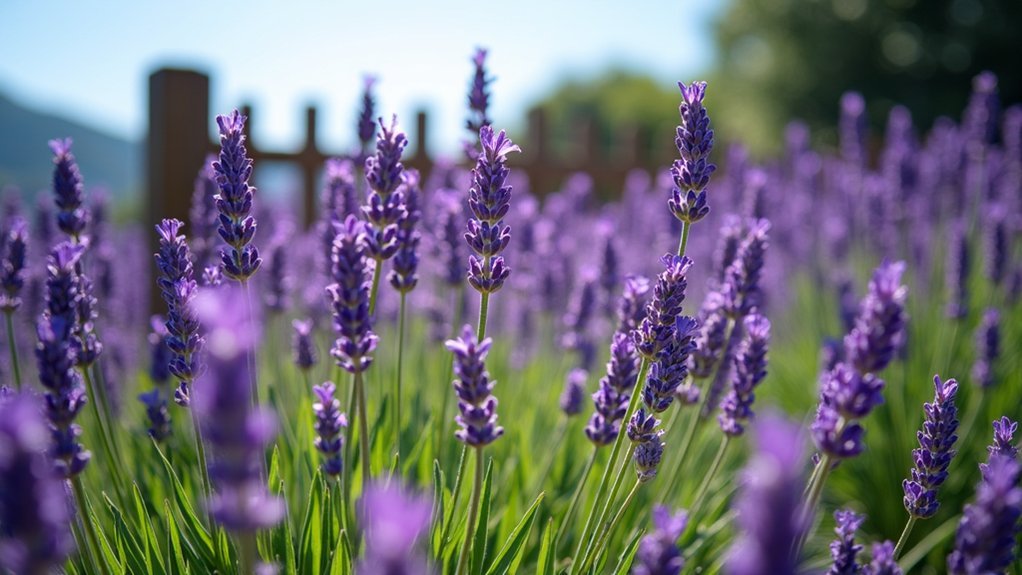
While many gardeners struggle with deer damage, lavender stands as a natural and elegant solution to this common problem. Its fragrant leaves contain linalool, a compound that’s particularly offensive to deer’s sensitive sense of smell, helping to deter deer from approaching your garden boundaries.
You’ll find that lavender thrives when planted in full sun and well-drained soil, making it perfect for border plantings. The plant’s fuzzy texture provides additional deer resistance, as these browsers dislike the feeling against their tongues.
For maximum effectiveness, trim your lavender regularly to promote bushier growth and stronger aroma.
As an added bonus, while these deer-resistant plants protect your garden, they’ll attract beneficial pollinators like bees and butterflies, creating a more balanced ecosystem around your home.
Rosemary: Creating Aromatic Boundaries in Your Garden
When establishing natural defenses against deer, rosemary emerges as one of the most effective aromatic barriers you can plant. Its strong fragrance masks surrounding plants while the fuzzy, textured leaves deter deer whose sensitive tongues avoid such surfaces.
This drought-tolerant herb serves multiple purposes in your garden. Plant rosemary along perimeters to create a natural, deer-resistant boundary that’s both functional and beautiful.
Regular pruning encourages bushier growth, creating denser protection for vulnerable plants.
Trim your rosemary regularly to develop thicker foliage—transforming each plant into a more effective living shield for your garden.
You’ll appreciate rosemary’s versatility – while it’s safeguarding your garden with its aromatic foliage, you’re also cultivating a useful culinary herb.
The essential oils that make deer turn away are the same compounds that add delicious flavor to your kitchen creations, offering you double the benefits from this protective planting.
Mint Varieties: Refreshing Scents That Keep Deer at Bay
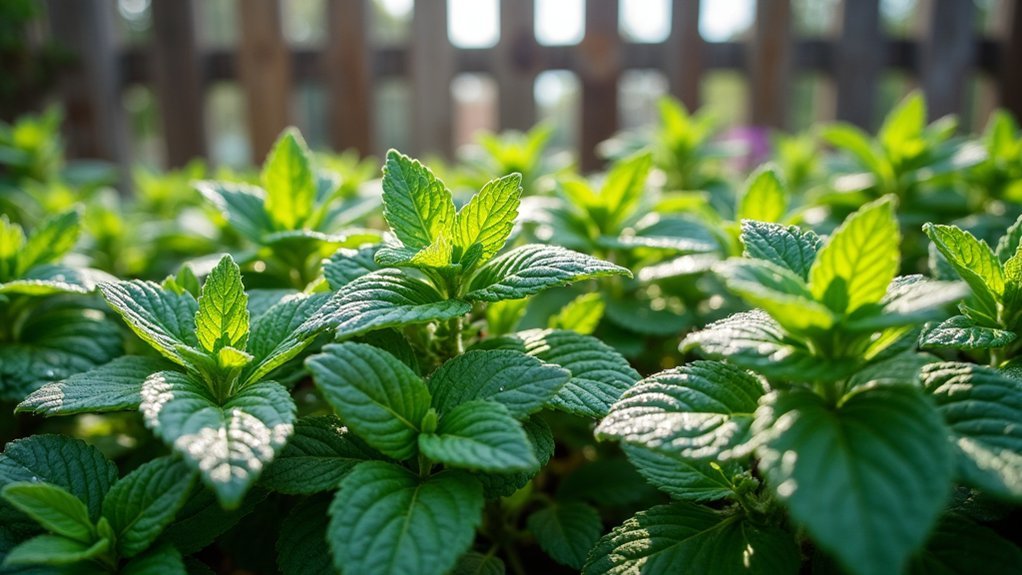
You’ll find peppermint’s powerful essential oils act as natural deer repellents when strategically planted along vulnerable garden edges.
Spearmint creates an effective border protection system when established in containers that frame your garden perimeter, preventing its aggressive spread while deterring hungry deer.
Lemon balm, another mint family member, combines a revitalizing citrus scent with deer-deterring properties, making it an excellent companion plant for your vegetable or flower beds.
Peppermint’s Natural Repellent Properties
Although deer may feast on many garden favorites, they’ll typically avoid peppermint due to its potent aromatic qualities. This deer-resistant herb produces a strong scent that overwhelms deer’s sensitive olfactory systems, making it an excellent natural boundary for your garden.
You’ll find peppermint particularly effective when planted densely along garden perimeters. Its vigorous spreading habit creates a robust aromatic barrier that helps repel deer while simultaneously crowding out unwanted weeds.
For maximum effectiveness, consider harvesting peppermint leaves regularly—this stimulates new growth and intensifies the fragrance that deer find so off-putting.
Spearmint For Border Protection
Similar to its cousin peppermint, spearmint offers exceptional deer-deterrent qualities that make it an ideal choice for protective garden borders. When you plant spearmint around vulnerable areas, you’ll create an aromatic barrier that deer naturally avoid due to its strong scent.
| Spearmint Benefits | Growing Conditions | Protection Level |
|---|---|---|
| Culinary uses | Partial shade | High effectiveness |
| Fast spreading | Moist soil | Natural barrier |
| Perennial growth | Adaptable | Dense coverage |
| Pleasant for humans | Low maintenance | Year-round protection |
Spearmint thrives in partially shaded spots with consistent moisture, quickly forming dense clumps that keep deer at bay. Its aggressive spreading nature works to your advantage, creating a continuous deer-resistant boundary. You’ll appreciate that this aromatic herb serves double duty—protecting your garden while providing fresh leaves for your kitchen.
Lemon Balm Deer Deterrence
With its bright citrus fragrance that deer find particularly offensive, lemon balm creates an effective natural barrier for protecting vulnerable garden areas. This deer resistant herb grows up to two feet tall and releases strong essential oils when brushed against or disturbed, intensifying its repellent properties.
You’ll find lemon balm thrives in partial sunlight and well-drained soil, making it adaptable to various garden locations.
As a member of the mint family, it spreads vigorously, forming dense borders that shield more delicate plants from browsing deer.
For maximum effectiveness, plant lemon balm abundantly around perimeters.
You’ll enjoy the added benefit of harvesting this versatile herb for teas and culinary uses while maintaining your garden’s natural deer defense system.
Sage and Oregano: Culinary Herbs That Double as Protection
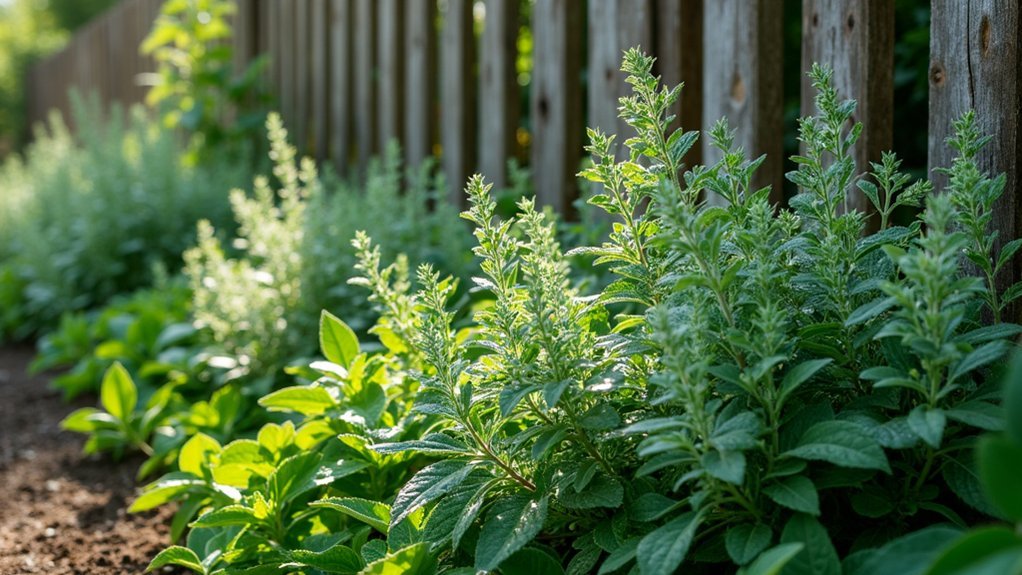
When planting sage and oregano, you’ll want to space them 12-18 inches apart along your garden’s perimeter to create an effective natural deer barrier.
Their fuzzy leaves and strong aromas contain essential oils that mask the scent of your more tempting plants, confusing deer’s sensitive noses.
For maximum deer-repelling effectiveness, regularly trim these culinary powerhouses to stimulate more aromatic growth, which strengthens their protective properties while providing you with fresh herbs for cooking.
Planting Techniques
Strategic placement of sage and oregano creates a formidable barrier against deer while enhancing your culinary repertoire. Plant these deer-resistant herbs along garden perimeters in well-drained soil where they’ll receive full sunlight.
Space sage plants 18-24 inches apart, allowing room for their fuzzy leaves to spread, while oregano can be placed 12 inches apart to form a dense understory.
For maximum effectiveness, create multi-layered plantings by positioning taller sage behind low-growing oregano. This arrangement optimizes both protection and harvesting accessibility.
Interplant these aromatic herbs among vulnerable vegetables or flowers for targeted protection. You’ll find these culinary workhorses perform double-duty—deterring deer with their strong essential oils while providing fresh ingredients for your kitchen.
Regular trimming encourages bushier growth, intensifying both fragrance and defensive capabilities.
Deer Avoidance Properties
Numerous chemical compounds in sage and oregano create nature’s perfect deer deterrent system.
These deer resistant herbs contain specialized aromatic oils that trigger avoidance behaviors in browsing wildlife. You’ll find their pungent smell pleasant for cooking but remarkably offensive to deer’s sensitive noses.
When planning your protective garden border, consider these deer avoidance properties:
- Sage’s fuzzy leaf texture combined with its aromatic oils creates a dual-action barrier that deer instinctively avoid.
- Oregano’s carvacrol and thymol compounds produce strong scents that mask the smell of nearby desirable plants.
- Both herbs maintain their repellent qualities year-round, providing continuous protection while contributing to your garden’s biodiversity.
You’ll enjoy both culinary benefits and natural protection when strategically incorporating these versatile herbs throughout your landscape.
Thyme for Defense: Low-Growing Border Solutions
Among the most effective aromatic deterrents, thyme stands out as a powerful ally in your battle against deer intrusion. This versatile herb creates a natural boundary that deer are reluctant to cross, thanks to its intense fragrance that overwhelms their sensitive noses.
You’ll appreciate how thyme thrives in poor soil conditions with minimal care, making it an ideal deer-resistant solution for busy gardeners.
Plant it strategically around vulnerable flowers and vegetables to create protective borders that work double-duty as attractive garden features.
The dense, low-growing habit of thyme forms an effective barrier while its fragrant blooms attract beneficial pollinators to your garden.
Lemon-Scented Options: Balm, Verbena, and More
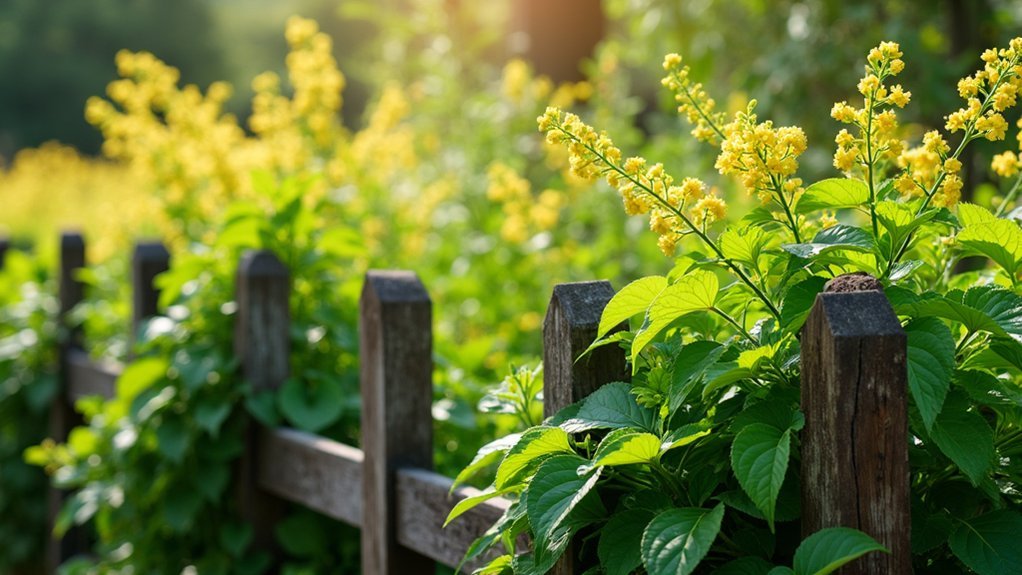
When deer approach your garden, the bright, citrusy aroma of lemon-scented herbs creates an invisible barrier they’re reluctant to cross.
Lemon balm and lemon verbena stand out as powerhouse deer resistant aromatic herbs that protect while adding delightful fragrance to your landscape.
For maximum effectiveness:
- Plant these lemon-scented herbs in full sun with well-drained soil along garden borders.
- Regularly harvest and bruise leaves to intensify their deer-deterring scent.
- Position them strategically to mask the smell of deer-favorite plants nearby.
You’ll find these aromatic defenders work hardest when their oils are most potent, typically on warm days.
As a bonus, both herbs are easy to maintain and provide the dual function of protection and culinary usefulness in your garden.
Designing Your Aromatic Herb Fence for Maximum Effectiveness
Creating an effective aromatic herb fence requires strategic planning that combines both botanical knowledge and thoughtful design principles.
Plant aromatic herbs in dense clusters along your garden’s perimeter, establishing a potent deer repellent barrier that’s both functional and attractive.
Layer your design by combining herbs of varying heights—tall dill and fennel behind shorter rosemary and thyme—to create a multi-dimensional deer resistant structure.
Select herbs with both strong scents and unpleasant textures; sage and thyme’s fuzzy leaves provide additional deterrence beyond their aromatics.
For ideal fencing design, incorporate a diverse herb selection including lavender, mint, and rosemary. Their powerful scents confuse and repel deer effectively.
Remember to maintain your herbs through regular pruning and harvesting, which stimulates growth and intensifies their aromatic properties for continued protection.
Frequently Asked Questions
What Herbs Are Most Deer Resistant?
You’ll find lavender, rosemary, sage, oregano, thyme, mint, and chives are most deer-resistant. Their strong scents and flavors naturally repel deer, making them avoid your garden when these aromatic herbs are present.
What Plant Smell Do Deer Hate the Most?
Deer hate mint smells the most. You’ll find peppermint and spearmint particularly effective as deterrents. They’re also repelled by strong-scented herbs like rosemary, lavender, and sage with their potent essential oils.
What Is a Natural Fence for Deer Resistant?
A natural fence for deer resistance uses aromatic herbs like rosemary, lavender, and sage. You’ll find deer hate these strong scents, and when you plant them densely around your garden’s perimeter, they’ll create an effective barrier.
Do Deer Hate the Smell of Rosemary?
Yes, deer hate the smell of rosemary. You’ll find its strong aroma, rich in essential oils like camphor and cineole, effectively deters them from your garden. Its fuzzy texture also discourages deer browsing.
In Summary
You’ll find that aromatic herbs offer a beautiful, practical solution to deer problems. They’re not just functional—they provide fragrance, culinary benefits, and visual appeal while protecting your garden. By selecting the right combination of herbs and maintaining them properly, you’ve got a natural barrier that works year-round. Start small, experiment with different varieties, and you’ll soon enjoy a deer-resistant garden that delights all your senses.

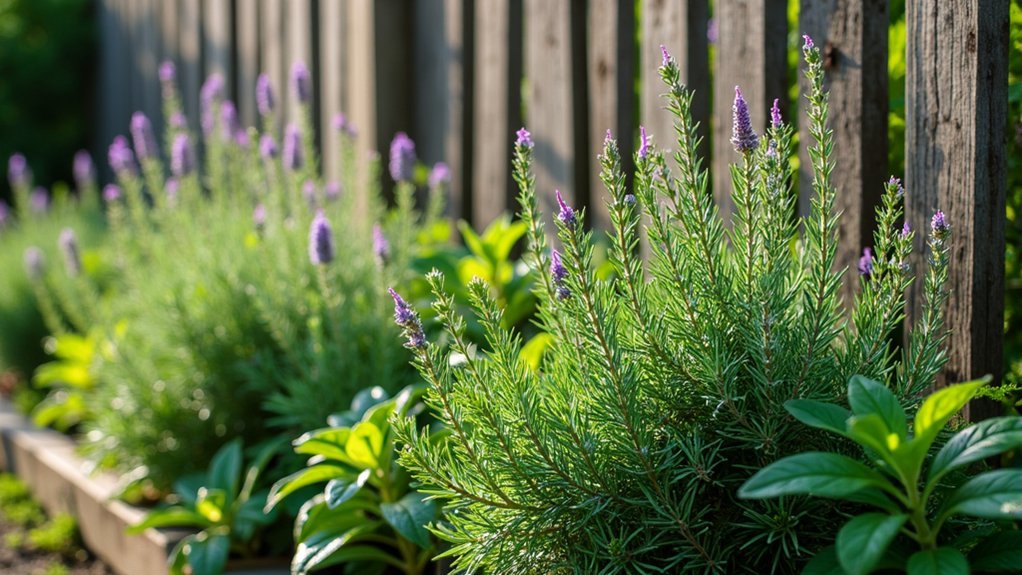

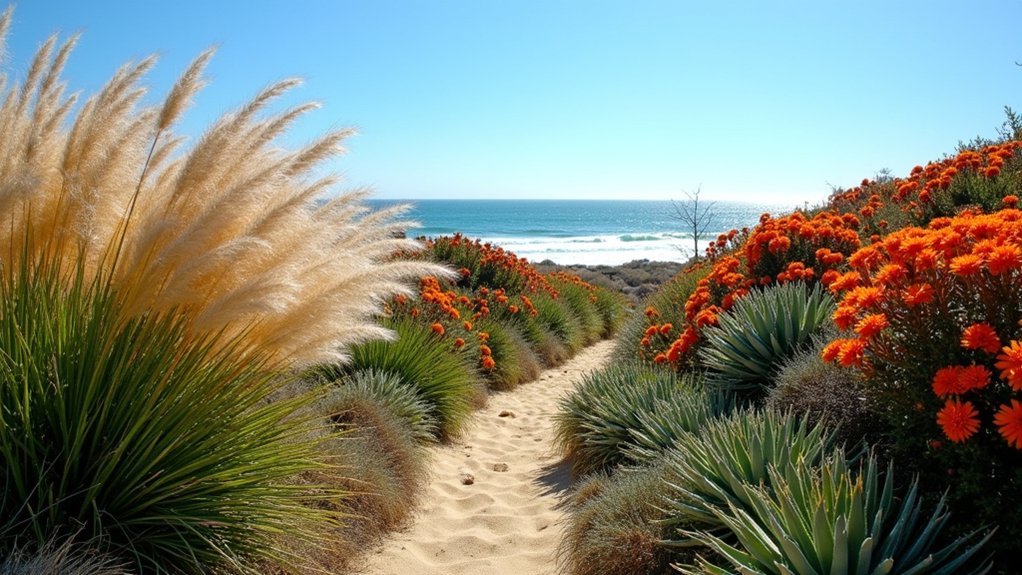
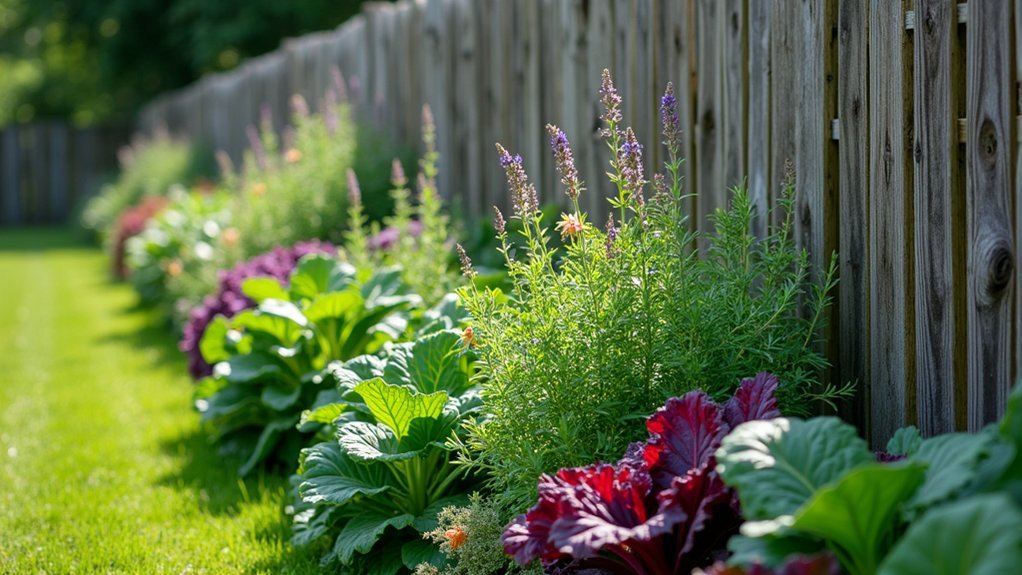
Leave a Reply